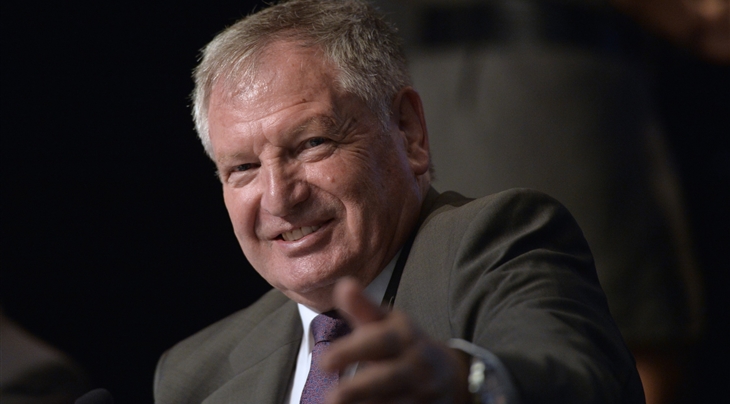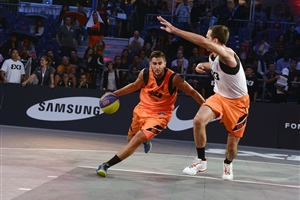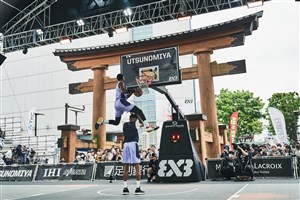
FIBA - Outgoing President Yvan Mainini reflects on tenure
BARCELONA - Outgoing FIBA President Yvan Mainini is seeing his term come to an end.
He talked to FIBA.com to reflect on his presidency and discuss FIBA's bright and busy future.
FIBA.com: Mr Mainini, as your four-year term as President of FIBA ends, what are the main things you take out of it personally?
Mainini: It's been four great years and I hope that the FIBA Basketball World Cup will be a great way to top it all off. What I will remember the most is the immense pleasure I took in being part of the excellent team work. This was something in place with (FIBA Secretary General) Patrick (Baumann) and which was extended with the two FIBA Vice-Presidents (Mr Mainini's predecessor as FIBA President, Bob Elphinston, and his successor, Horacio Muratore). I also got to experience it with all of the (FIBA) staff that is behind us and works tirelessly to provide a great support system. I think a president can only be good if he has good people with him and that is the case at FIBA.
FIBA is my family. It's been my family for a long time. I joined in July 1973. That's 41 years already. Time has flown by. During that time, I've had the chance of knowing the three Secretary Generals of FIBA: Dr William Jones, Borislav Stankovic and Patrick Baumann and working closely with the latter two.
FIBA.com: What accomplishments from the period 2010-2014 stand out the most for you?
Mainini: We used these past four years to work very hard on the designated four pillars of our strategic plan. A few months ago, the Extraordinary World Congress in Istanbul resulted in a landmark change in the culture of our association, comparable in terms of impact with that of the famous agreement between Borislav Stankovic and David Stern that opened the path for professional NBA players to compete in the Barcelona 1992 Olympic Games.
We used these past four years to work very hard on the designated four pillars of our strategic plan.
First pillar: At the Extraordinary World Congress in Istanbul last March, our membership did not just vote on a change in governance. The real message was more subtle and empowering. Confidence and unity are to be the watchwords as we work to achieve a necessary transformation. This is not a radical new beginning but rather a form of continuity in the sense that we should consider ourselves as a delegation of the Congress. Every member of the FIBA Family is expected to assume a vigilant responsibility in the evaluation of our progress.
Second pillar: The development of 3x3 basketball for all - university/college level, children, veterans, men and women, elite and amateur. This variation of basketball - which should be introduced as an Olympic sport at the 2020 Tokyo Olympics - constitutes a significant accelerator for basketball as it has the capacity to enable countries with more modest sporting budgets to attain international recognition. "From the Street to the World Stage" - this is definitely a step in the right direction and the recent men’s world championship title won by Qatar is further proof of the sport’s growing popularity.
Third pillar: The House of Basketball, FIBA's new headquarters, was inaugurated last year and received high praise and appreciation not only from our own members, but also from other International Federations and numerous groups that have visited the Naismith Arena and the FIBA Hall of Fame. This decision to create worthy head offices, taken back in 1968, came to fruition thanks to the unfailing determination of FIBA Honorary Treasurer Manfred Stroher, supported by Bob Elphinston and Richard Baillif. The result is an operations base for FIBA initiatives that this generation and future ones can utilise and appreciate.
Fourth pillar: The immediate result that comes from governance developments can be seen in the new calendar. It encapsulates all of the new directions and qualities necessary to FIBA's progression. In the immediate short-term, it will help reinforce the National Federations by making them stronger and more autonomous (basketball courts, marketing, communication, television, etc.). An enormous buzz will be created through media exposure of the national teams 1,600 times in 18 months. In the longer term, it will be an engine for growth for affiliated clubs and institutions. The aim for the future is to have a major club competition, like the NBA, per continent.
FIBA.com: Looking to the future, what do you see as important things for FIBA to stay true to?
Mainini: We should keep in mind the solid principles that form the foundations of FIBA today. This association was created 82 years ago by visionaries and developed by individuals unified by a common mission.
We should keep in mind the solid principles that form the foundations of FIBA today.
Of course, the world has changed over time and to disregard the current economy would be fatal. This is undoubtedly the major challenge for the coming years. Addressing it will require men and women who, without losing sight of our founding principles, can also provide new solutions. The required solidarity in a world defined by inequalities is the vital spark igniting FIBA's humanist work. It is only by working together with humility, simplicity and constructive energy, that we can hope to overcome the challenges of the next decade and propel basketball into the top tier of world sport.
The exposure of our best product, the national teams, will necessarily attract the attention of new partners and an increased fan-base. It will of course have beneficial knock-on effects in economic terms for the clubs. To achieve this goal will require patience and also the recognition that the principal actors in all of this are the players and that it is through them that the sport will develop.
If our analysis is correct, our development must necessarily depend upon the progression of our members and we cannot achieve it alone. FIBA will continue with its structural consolidation, but our principle assets will always be a solid base and growing popularity.
FIBA.com: What are FIBA's best attributes for the years ahead?
Mainini: Our main strength moving forward consists in having 214 National Basketball Federations spread throughout the world.
We are one FIBA, we are united and we are all pulling in the same direction.
The evaluation of their needs, the realisation of their dreams and the training of their players must always remain the driving force behind our approach. In concrete terms, our business sector is developing positively and the budget is growing but FIBA is not a bank, we have no shareholders and our purpose is to provide support for projects rather than the distribution of funds. The creation of projects is only possible with the help of our members. If we lack the patience and integrity to invest – and especially to believe – in an overall development strategy, then we will surely fail. Our future is in all our hands, young and old, players and fans. We all have an important role to play in the popularisation of our sport.
Another important factor that helps us going forward is the fact that we are one FIBA, we are united and we are all pulling in the same direction. There is peace within FIBA and so we don't have to concern ourselves with needless battles. There are no longer walls to separate the zones.
FIBA
















